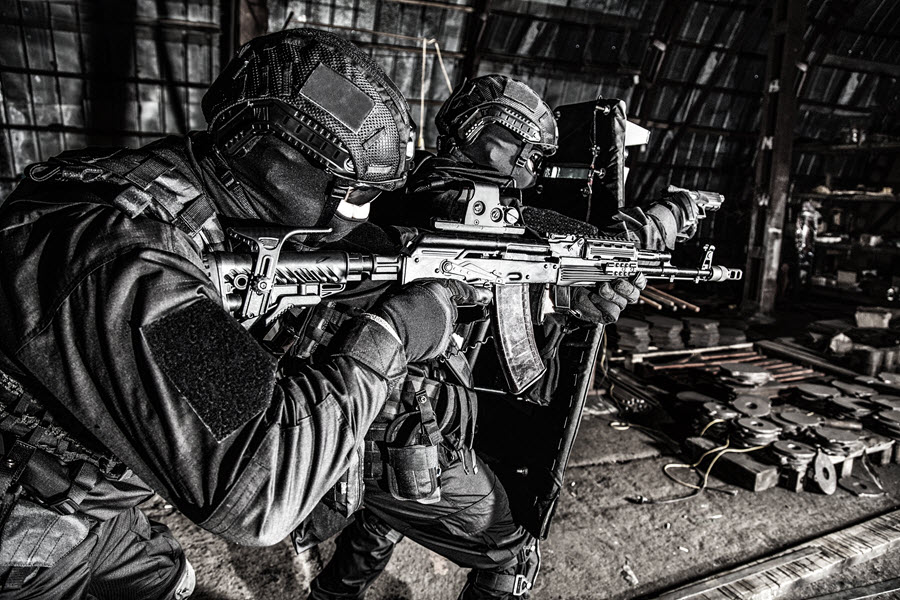No one. That is, unless you are from an affluent family who has the means to pay for these types of services or have the proper insurance capable of handling this situation.
Why the high cost? It simply has to do with the fact that hostage rescue operations are extremely risky to both the operator(s) conducting the hostage rescue and the hostage(s) themselves. You are essentially asking others to risk their lives on behalf of your own. Secondly, when you’re in a foreign country, US taxpayers are not funding the cost of your rescue (via local or federal law enforcement) – so you are the only one footing the very hefty bill. Because of this, only the very affluent are typically able to afford this type of service.
But have you ever wondered what happens during a hostage situation in a foreign country? There are many different people and groups involved, and it’s important to know who those people are and what they do to help end a hostage situation. From the Hostage Rescue Team and negotiators, everyone has an important role to play to end the hostage situation peacefully.
What are Hostage Situations?
Hostage situations differ because of the motivation of the kidnapper and the circumstances that surround the hostage situation. There are two types of kidnappings that typically occur. However, there are a few things that apply to all hostage situations:
- Nine times out of ten, the kidnapping is simply a business transaction conducted by cartels, organized crime, or other criminal entities for the purpose of making quick, easy, and sometimes large sums of money for relatively little work (providing that the individual being kidnapped has a large Kidnap & Ransom (K&R) insurance policy. These types of business deals help to fund other illegal activities within criminal enterprises.
- The remaining ~10% of kidnapping situations that occur are intended to cause fear, bodily harm, and even death.
- The hostage-taker usually asks to get something in return for the hostage. This can be anything from safe passage to another country, money, or personal safety. Alternatively, they could be asking for something that involves political goals.
- The target that the hostage-taker aims for isn’t usually the hostage themselves. Most of the time, it’s a third party (i.e. a company, wealthy parent of a child, etc.) that can provide what the hostage-taker wants.
- The hostages are only taken to be used as bargaining chips. There are times when hostages have a symbolic value, but the hostages can technically be anyone.
There are several stages to a hostage situation, including:
The Initial Phase
The initial phase can be brief and violent because it only goes for the length of time of the attack that hostage-takers make to subdue their hostage(s). The initial phase ends with demands being made.
Negotiation Phase
When this phase happens, it’s usually because law enforcement or a private mediator has arrived and they have acknowledged the demands. This phase can last days, hours, or even months and is often called “the standoff phase.” Nothing much changes about the physical description of the scene greatly because the hostages and hostage-taker are in the same place.
However, there are many things that happen during the negotiation phase in terms of emotional relationships that develop between everyone involved in the situation. This is when the negotiator comes in and tries to manipulate the relationships that are made in a way that makes the situation end peacefully.
Termination Phase
The final stage is brief and can sometimes be violent. This phase has three possible end-results:

- The hostage-takers are arrested after surrendering peacefully
- The hostage-takers are killed or assaulted by the rescue team before being arrested
- The demands are met, and the hostage-takers escape
The fate of the hostages doesn’t always depend on how the final phase is completed.
Hostage Rescue Teams and Companies
Within the US, the elite tactical team that the FBI sends out during hostage situations is called the Hostage Rescue Team (HRT). This group was originally created to give full-time tactical capability for federal law enforcement. Today, they perform a variety of national security functions and tactical law enforcement in environments that are considered high-risk.
The primary roles of the Hostage Rescue Team are hostage rescue and counter-terrorism. They also have people working as hostage negotiators.
But a kidnapping or hostage situation that occurs outside of the US is outside of the direct jurisdiction of the FBI…so who will come to your rescue if you’re kidnapped in a country outside of the US?
This may surprise you but niche private security companies are regularly called upon and retained by the ultra wealthy and elite executives when traveling abroad to provide this service. The ultra wealthy are high-priority targets for criminals and cartels as ransoms for kidnappings fund a large portion of illicit activity globally.
But there are various reasons why one may be selected as a target for kidnapping – it’s not simply limited to the ultra-wealthy. Unfortunately, hostage rescue services from private security companies comes at a premium most people cannot afford, ranging anywhere from $30,000 – $50,000 per day – or higher, depending upon the scale of the operation. Why the high price?
The high price is due largely to the fact that there are only a handful of highly skilled negotiators in the world that have the experience and proven success rate to deal with these types of situations. These negotiators often times cost several thousand dollars per hour for these services – and if required to deploy OCONUS (Outside of the Continental United States) then all incurred deployment costs associated with the operation typically become a pass-through cost, billed to the client.
Another factor that contributes to the high price of this type of specialized service is the fact that the speed of response is critical during negotiations and there is a premium paid to make the negotiator pull a magic trick by arriving in country yesterday. When crisis strikes and these elite professionals are requested to depart their homes at a moment’s notice to travel anywhere in the world the client can expect pass through costs of first class flights, high end hotels, and all around well taken care of as no expense is spared. All these factors drive up that per day cost, but the client is really paying for expertise and a white glove style of service that very few companies in the world can deliver.
The primary goals of a hostage negotiator including:
Make the situation last longer
The more time that a hostage situation takes the more likely there will be a peaceful ending. There are tactics that can be used to do this, including getting deadlines pushed back, stalling so an official with more authority can come in, or focusing the hostage-takers’ attention on small details and asking open-ended questions.
Ensure that hostages are safe
This objective means that the negotiator needs to be able to convince the hostage-taker to allow medical treatment or release of injured or sick hostages, negotiating food and water delivery, and the negotiation of as many hostages as possible.
Keep the hostage situation calm
The very last thing that you want to have happen is to create an emotion-filled hostage situation. Hostage-takers, in the first few hours of the negotiation, can be volatile because they’re usually angry about whatever injustice that led them to take a hostage and they’re filled with adrenaline.
Excited and angry people with weapons aren’t good for hostages. The negotiator should never say no to a demand or argue with the hostage-taker. Instead, they should use delaying tactics or make counter offers. They should also keep a positive, upbeat attitude, and help reassure the hostage-taker that everything will work out eventually.
There are six skills that hostage negotiators need to have in order to succeed in their roles:
- Active listening
- Time
- De-escalate
- Empathy and rapport
- Influence
- Control
An effective hostage negotiator will be able to use all of these skills to reduce negative emotions that are dictating a person’s actions and help bring back a rational thinking process by using the skills mentioned above.
Who Needs to Worry?
If you’re worried about being kidnapped in a foreign country, 99% of the population (economic middle class or below) are at a relatively low to moderate risk of being targeted, depending upon where you’re traveling and how you’re presenting yourself. The biggest risks for the majority of foreign travelers involve: 1) not knowing the land, 2) being in the wrong place at the wrong time, and/or 3) being caught up in a situation that doesn’t directly involve you.
The only people that truly need to worry about targeted kidnappings are those that make up ~1% of the population. Even if you think you’re keeping a low-profile, if you are traveling OCONUS and coming in on a private aircraft of any type (whether by turbo-prop or jet engine), you have just made yourself a target and should be extra cautious. Most cartels, terrorists, and/or criminal elements place spotters at private airfields (especially those in popular tourist destinations for the world’s ultra-elite) who are identifying aircraft, their passengers, and what vehicles they are traveling in – and then subsequently relaying that information to a snatch-and-grab or surveillance team that can acquire follow.
What Can You Do to Prevent Yourself From Being Kidnapped?
After reading the above, if you determined that you’re among the 1% then you can afford to hire a low-profile kidnap-prevention team to shadow your movements while traveling abroad.
If this is beyond your budget there are some steps you can take to mitigate and better safeguard your family. Below are a few tips everyone can do and practice before traveling abroad:
- Leave all jewelry and luxury time pieces at home within the safer confines of your home.
- Disguise your passports with passport covers of another nation. This cover can make your passport look like that of any other nation on the planet.
- Dress like the locals.
- Know the local language.
Final Thoughts
Hostage situations are difficult events to deal with. There are so many people involved in these situations, including hostage negotiators, law-enforcement, hostage rescue companies, and/or foreign governments.
No matter who is involved, the ultimate goal is to have the situation end peacefully and with the hostage being freed, unharmed and the hostage-takers being arrested. Hostage situations can take place in foreign countries or in the United States – but they still involve the same people.
If you need help figuring out what you need, you can request a free security assessment through our Security Needs Assessment and Intake Form . Our security experts have a wealth of experience in conducting hostage rescue and anti-kidnap operations all around the world. We will assess your security needs and can then recommend vetted security providers who possess the expertise in the type of support you’re requesting. We’ll also provide you an idea or range of rates of what you can expect to be quoted from a skilled and reputable security service provider.

